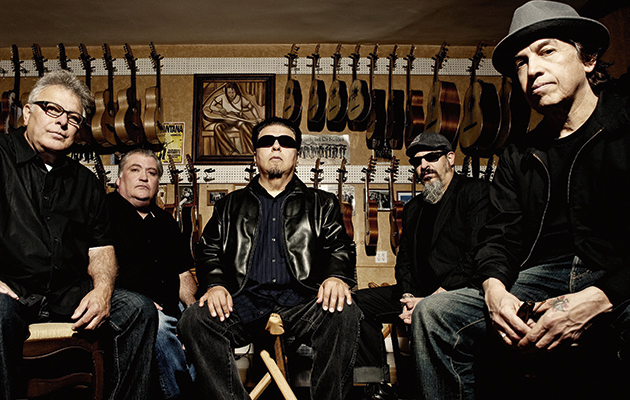LATIN PLAYBOYS
LATIN PLAYBOYS
SLASH/WARNER BROS, 1994
A side-project begun by David Hidalgo on a four-track tape machine in his kitchen that soon expanded to include Pérez, Mitchell Froom and Tchad Blake.
HIDALGO: I had such a good time doing Kiko that I was enjoying that newfound freedom. So we just kept going, and when the family would go to sleep, I’d set up my little four-track player/recorder in the kitchen and go through drawers looking for stuff to play. I was playing slide with a butter knife and skewers. I was writing just to see what I could do, and it was a fun process, so I just kept going with it. When I played the stuff for Louie, he said, “Wow, this is different, man. This isn’t Lobos, this is something else. We should do something with this.” So he took the tracks and he wrote lyrics, then he gave them back to me and said, “OK, now you match them up.”
Then we got together with Mitchell and Tchad, and Tchad had this whole catalogue of sounds. Wherever he’d go – India, Africa, Australia – he would walk down the street with an adapter in his pocket and stereo mics in his baseball cap, so he had all this stuff catalogued. That had a lot to do with the sound of the album. We decided to make it a band, and there was a group in East LA called The Latin Playboys, so we stole it.
____________________
LOS LOBOS
COLOSSAL HEAD
SLASH/WARNER BROS, 1996
The band embraced Chicago blues motifs on the second of their trilogy of envelope-pushing projects with Froom and Blake.
BERLIN: When we hooked up with Robert Rodriguez to do the soundtrack to Desperado, he wanted an hour and 10 minutes of music for an hour-and-20-minute movie. It was insane to try to come up with so much music, but we’d also locked in our time to go into the studio with Mitchell and Tchad, so the morning after we finished Desperado, we started Colossal Head. Robert had sucked every shred of an idea out of us. When we walked in the studio with literally nothing, Dave said, “Well, what would Jimmy Reed do?” So we started making Colossal Head with the idea of making a Jimmy Reed record, and I really hear that in all the underpinnings of the songs.
HIDALGO: Willie Dixon produced “Who Do You Love?”, the Bo Diddley song, for the La Bamba album. People think the blues is just about feeling – expressing yourself. But Willie came in and orchestrated the thing. That inspired me to try stuff like that. So a lot of the songs on Colossal Head are blues-based. I was just trying to use what I’d learnt from Willie. Colossal Head was one of my favourite albums.
______________________
LOS SUPER SEVEN
LOS SUPER SEVEN
RCA NASHVILLE, 1998
In another freewheeling side project, Rosas, Hidalgo and Berlin hooked up with members of Los Texmaniacs and Aztex to form a one-off Tex-Mex supergroup. Also in attendance: country/blues/Tex-Mex legend, Doug Sahm.
HIDALGO: The core band consisted of Max Baca, Joel Guzman, César, Steve and me. Each person that was featured had the say on what they wanted to do, and we backed them up. The first day, we were gonna do a song with Freddy Fender. He didn’t have a nylon-string guitar, but he sees the acoustic bass, and he goes, “I haven’t played bass in a long time; I’ll play bass on this.” That started the whole attitude towards the Los Super Seven album – it was like, let’s just make do with what we got. It all went by fast, and it was a lot of fun to do.
BERLIN: In a weird way, the whole notion of the record was all about Doug Sahm’s life – the combination of white and brown and the mixing of the cultures. Doug was hanging out at the studio the whole time, but on the last day of recording, we realised that we hadn’t gotten him down on the record. He was pulling out of Cedar Creek Studios, and I went running down the driveway and caught up with him.
I said, “Doug, I’m so sorry, but would you consider coming back in and singing the bridge to ‘Rio De Tenampa’ for us?” So he says, “Yeah, sure.” He outs the car in park with the engine on and the door open, walks back down the driveway into the studio and sings the bridge in one take – knocked it out of the park. He said goodbye again, and that was the last time I ever saw Doug.



